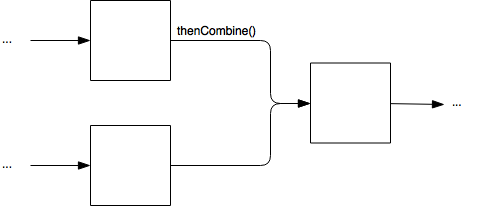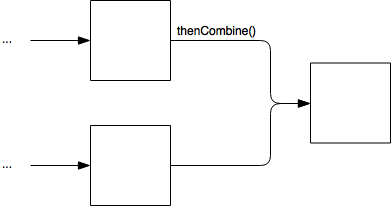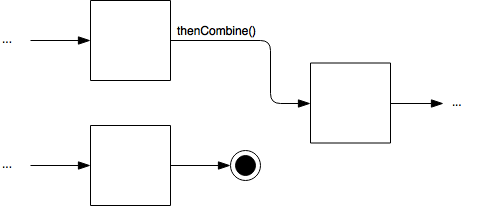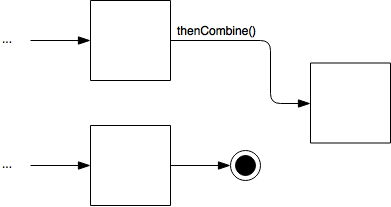TIL: CompletableFuture Cheat Sheet
Creating First Async Task

CompletableFuture<String> foo = CompletableFuture.supplyAsync(() -> "foo");
Chaining Dependent Futures
Chain futures one after the other, thus creating a transformation pipeline. One item of the chain acts on the completion of the previous one.
Intermediate Stages (apply)

- thenApply
- chains task dependent on a future
- passes result from previous stage
- result is wrapped in CompletableFuture
CompletableFuture<String> uppperCaseFoo = foo.thenApply(s -> s.toUpperCase());
- thenCompose
- chains one future dependent on the other
- if subsequent stage is async, and returns CompletableFuture, thenApply would return
CompletableFuture<CompletableFuture<T>> CompletableFuture<CompletableFuture<String>> upperCaseFoo = foo.thenApply(s -> supplyAsync(() -> s.toUpperCase);- thenCompose flattens nested CompletableFutures
CompletableFuture<String> upperCaseFoo = foo.thenCompose(s -> supplyAsync(() -> s.toUpperCase()));
Terminal Stages (accept, run)

- Terminal stages return
CompletableFuture<Void> - thenAccept receives result of previous stage
foo.thenAccept(s -> LOGGER.info("ThenAccept {}", s));
- thenRun does not receive result of previous stage
foo.thenRun(() -> LOGGER.info("ThenRun."));
Summary
CompletableFuture’s vast number of api methods can be understood with the help proper understanding of the terms
- apply: receive result from previous stage; return transformation result wrapped in CompletableFuture
- compose: same as apply, except that it expects an async transformation stage; multiple levels of CompletableFutures are flattened in returned result
- accept: acts on previous stage’s result; does not produce transformed output
- run: does not receive result of previous stage; acts on the fact that previous stage has completed
Chaining Independent Futures
Wait for the completion of two independent futures, act on their combined results.
Intermediate Stages (apply)

- thenCombine combines two independent futures when both have completed
-
produces CompletableFuture from the combination of the two inputs
CompletableFuture<String> stringFuture = supplyAsync(() -> "5"); CompletableFuture<Integer> intFuture = supplyAsync(() -> 5); CompletableFuture<Long> combinedFuture = stringFuture.thenCombine(intFuture, (s, n) -> (long) (parseInt(s) * n));
Terminal Stages (accept, run)

- Terminal stage combines two independent futures when both have completed
- does not produce transformed result; returns CompletableFuture
- NB! has to return something so that it can be waited on to complete
- thenAcceptBoth receives result from both of previous futures
-
runAfterBoth does not receive result of previous stages; acts on the fact that both have completed
CompletableFuture<String> firstFuture = supplyAsync(() -> "first"); CompletableFuture<String> secondFuture = supplyAsync(() -> "second"); firstFuture.thenAcceptBoth(secondFuture, (first, second) -> LOGGER.info("First: {}, Second: {}", first, second)); firstFuture.runAfterBoth(secondFuture, () -> LOGGER.info("Both First and Second Completed"));
Wait for One of the Independent Futures
Wait for the completion of one of two independent futures; act on the result of this single one previous future.
Intermediate Stages (apply)

- applyToEither transforms result of one of the two previous stages, which has completed normally
- both of the previous stages produce the same type
- returns CompletableFuture of transformation result
- completes exceptionally only if both previous stages fail
- expects Function as second parameter applied to transformation result
- equivalent to
fastFuture.applyToEither(reliableFuture).thenApply(fn); -
single parameter applyToEither does not exist in api
CompletableFuture
fastFuture = supplyAsync(() -> "fast future"); CompletableFuture reliableFuture = supplyAsync(() -> "reliable future"); CompletableFuture firstDoneFuture = fastFuture.applyToEither(reliableFuture, Function.identity());
- equivalent to
Terminal Stages (accept, run)

- acceptEither receives result from one of the two previous stages to complete first
- runAfterEither acts on the first completion of the two previous stages; does not receive input
- completes exceptionally only if both previous stages complete exceptionally
- does not produce transformed result; returns
CompletableFuture<Void> -
both of the previous stages produce the same type
CompletableFuture<String> fastFuture = supplyAsync(() -> "fast future"); CompletableFuture<String> reliableFuture = supplyAsync(() -> "reliable future"); fastFuture.acceptEither(reliableFuture, s -> LOGGER.info("First one completed: {}", s)); fastFuture.runAfterEither(reliableFuture, () -> LOGGER.info("One of the two completed")); -
acceptEither example
Semaphore sema = new Semaphore(0); CompletableFuture<String> willThrow = supplyAsync(() -> { LOGGER.info("going to fail..."); throw new RuntimeException("I failed..."); }); CompletableFuture<String> willComplete = supplyAsync(() -> { LOGGER.info("supplying..."); return "yay"; }); willThrow.acceptEither(willComplete, (s) -> { LOGGER.info("acceptEither completed: {}", s); }).exceptionally((e) -> { LOGGER.info("acceptEither failed: {}", e.getMessage()); return null; }).thenRun(sema::release); LOGGER.info("Waiting for semaphore"); sema.acquire();
Chaining Arbitrary Number of Futures
AllOf
CompletableFuture api supports the chaining of an arbitrary number of futures via the static helper method CompletableFuture.allOf(...). It returns CompletableFuture<Void>, which allows to wait for the completion of every future, but does not allow access to teh individual results.
To get around to it, provide own implementations of allOf() as
private static <T> CompletableFuture<List<T>> allOf(List<CompletableFuture<T>> futures) {
CompletableFuture<Void> allCompleted = CompletableFuture.allOf(futures.toArray(new CompletableFuture[futures.size()]));
return allCompleted.thenApply(v -> futures.stream()
.map(CompletableFuture::join)
.collect(toList()));
}
Thus for the futures
CompletableFuture<String> a = supplyAsync(() -> "a");
CompletableFuture<String> b = supplyAsync(() -> "b");
CompletableFuture<String> c = supplyAsync(() -> "c");
instead of
CompletableFuture<Void> allFutures = CompletableFuture.allOf(a, b, c);
we can have
CompletableFuture<List<String>> allOfThem = allOf(Arrays.asList(a, b, c));
AnyOf
CompletableFuture.anyOf(...) is the multiple argument equivalent of applyToEither; returns CompletableFuture<Object>. For example:
CompletableFuture<Object> anyOfThem = CompletableFuture.anyOf(a, b, c);
Async Timeouts
Java8 CompletableFuture api does not allow setting timeouts for individual stages. This limitation can be circumvented with some duct tape:
public static <T> CompletableFuture<T> timeoutAfter(int timeout, TimeUnit timeUnit) {
final CompletableFuture<T> promise = new CompletableFuture<>();
scheduledThreadPoolExecutor.schedule(() -> promise.completeExceptionally(new RuntimeException("time out")), timeout, timeUnit);
return promise;
}
CompletableFuture.supplyAsync(() ->...)
.future.applyToEither(timeoutAfter(timeoutMillis, MILLISECONDS), Function.identity())
.exceptionally(e -> {
// ...
});